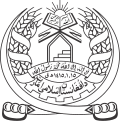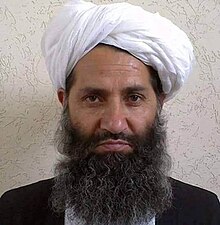
Back أمراء إمارة أفغانستان الإسلامية Arabic Əfqanıstan İslam Əmirliyinin lideri Azerbaijani Jefe del Emirato Islámico de Afganistán Spanish Afganistani Islamiemiraadi juht Estonian رهبر امارت اسلامی افغانستان Persian Pemimpin Tertinggi Afganistan ID Guida suprema dei talebani Italian Pemimpin Emiriah Islam Afghanistan Malay د افغانستان امیرالمؤمنین Pashto/Pushto Líder Supremo do Afeganistão Portuguese
| Supreme Leader of the Islamic Emirate of Afghanistan | |
|---|---|
 | |
| Leadership of the Islamic Emirate | |
| Style | |
| Type | Supreme leader |
| Status | Head of state |
| Member of | Leadership Council |
| Residence | None official[2] |
| Seat | Kandahar |
| Appointer | Leadership Council |
| Term length | Life tenure |
| Constituting instrument | 1998 dastur |
| Precursor | President of Afghanistan |
| Inaugural holder | Mullah Omar |
| Formation | 15 August 2021 (current form) 4 April 1996 (originally) |
| Deputy | Deputy Leader |
| Salary | Afs. 228,750 monthly |
 |
|---|
|
|
The supreme leader of Afghanistan[3] (Pashto: د افغانستان مشر, romanized: Də Afġānistān Damshīr, Dari: رهبر افغانستان, romanized: Rahbar-e Afghānistān), officially the supreme leader of the Islamic Emirate of Afghanistan[4][5][note 1] and also styled by his religious title Amir al-Mu'minin (Arabic, lit. 'Commander of the Faithful'), is the absolute ruler, head of state, and national religious leader of Afghanistan, as well as the leader of the Taliban.[10][11][12] The supreme leader wields unlimited authority and is the ultimate source of all law.[12][13][14]
The first supreme leader, Mullah Omar, ruled Afghanistan from 1996 to 2001 before his government was overthrown by the United States and he was forced into exile. The current supreme leader is Hibatullah Akhundzada, who assumed office in exile during the Taliban insurgency on 25 May 2016, upon being chosen by the Leadership Council, and came to power on 15 August 2021 with the Taliban's victory over U.S.-backed forces in the 2001–2021 war. Since coming to power, Akhundzada has issued numerous decrees that have profoundly reshaped government and daily life in Afghanistan by implementing his strict interpretation of the Hanafi school of Sharia law.
The supreme leader appoints and manages the activities of the prime minister and other members of the Cabinet, as well as judges and provincial and local leaders.[12]
- ^ a b c "Acting Minister of Education Meets Esteemed Amir-ul-Momineen". Islamic Emirate of Afghanistan – Voice of Jihad. Kandahar. 8 February 2022. Archived from the original on 8 February 2022. Retrieved 11 February 2022.
- ^ Constable, Pamela (4 June 2023). "Taliban moving senior officials to Kandahar. Will it mean a harder line?". The Washington Post. Retrieved 13 June 2023.
- ^ "Afghan supreme leader orders full implementation of sharia law". Agence France-Presse. Kabul. The Guardian. 14 November 2022. Retrieved 27 November 2022.
- ^ "Message of Amir-ul-Mumineen Sheikh-ul-Hadith Hibatullah Akhundzadah, the Supreme Leader of IEA on the Arrival of Eid-ul-Fitr – Islamic Emirate of Afghanistan". 29 April 2022. Retrieved 29 April 2022.
- ^ "IEA leader gives order to round up Kabul beggars, provide them with jobs | Ariana News". www.ariananews.af. 8 August 2022. Retrieved 12 August 2022.
- ^ "Hibatullah Akhundzada reiterates his commitment to amnesty". The Killid Group (in Pashto). 30 December 2021. Retrieved 22 April 2022.
- ^ "IEA's supreme leader calls on officials to adhere to amnesty orders". Ariana News (in Pashto). 30 December 2021. Retrieved 22 April 2022.
- ^ "IEA takes massive anti-drug step, bans poppy cultivation". Ariana News (in Dari). 3 April 2022. Retrieved 22 April 2022.
- ^ "Taliban leadership council meets". The Killid Group (in Dari). 1 September 2021. Retrieved 22 April 2022.
- ^ Ramachandran, Sudha (10 September 2021). "What Role Will the Taliban's 'Supreme Leader' Play in the New Government?". The Diplomat. Retrieved 5 March 2022.
- ^ Faulkner, Charlie (3 September 2021). "Spiritual leader is Afghanistan's head of state — with bomb suspect set to be PM". The Times. Retrieved 6 March 2022.
- ^ a b c Dawi, Akmal (28 March 2023). "Unseen Taliban Leader Wields Godlike Powers in Afghanistan". Voice of America. Retrieved 13 April 2023.
- ^ T. S. Tirumurti (26 May 2022). "Letter dated 25 May 2022 from the Chair of the Security Council Committee established pursuant to resolution 1988 (2011) addressed to the President of the Security Council" (PDF). United Nations Security Council. Retrieved 2 May 2023.
- ^ Kraemer, Thomas (27 November 2022). "Afghanistan dispatch: Taliban leaders issue new orders on law-making process, enforcement of court orders from previous government". JURIST. Retrieved 1 May 2023.
Cite error: There are <ref group=note> tags on this page, but the references will not show without a {{reflist|group=note}} template (see the help page).
© MMXXIII Rich X Search. We shall prevail. All rights reserved. Rich X Search
